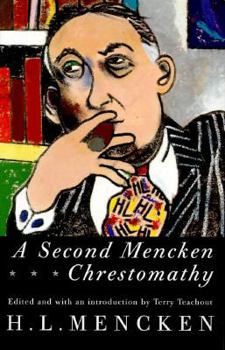Second Mencken Chrestomathy
Select Format
Select Condition 
Book Overview
With a style that combined biting sarcasm with the "language of the free lunch counter," Henry Louis Mencken shook politics and politicians for nearly half a century. With a style that combined biting... This description may be from another edition of this product.
Format:Paperback
Language:English
ISBN:0679764070
ISBN13:9780679764076
Release Date:September 1995
Publisher:Vintage Books USA
Length:491 Pages
Weight:0.85 lbs.
Dimensions:1.0" x 5.2" x 8.1"
Customer Reviews
3 ratings
Right or wrong he entertains
Published by Thriftbooks.com User , 17 years ago
He has something opinionated to write about practically everything. It is hard to imagine a reader who will not find something they are interested in this book. He is writing to relieve some kind of artistic tension. He does not try to prove anything with a lot of facts. H. L. Mencken likes to deposit a well written idea that is designed to attract attention by coming across as extreme or different from conventional wisdom and then move on to the next subject. For instance, most historians think that Martin Luther's Reformation had something to do with starting the Renaissance. Mencken creatively states as fact that Luther killed the Renaissance that was raising in Rome.
Superb Collection of Essays
Published by Thriftbooks.com User , 21 years ago
Perhaps in some ways even better than the first Chrestomathy, this postumous book is still another shining example of Mencken's prolificacy and erudition. The Mencken oeuvre would be incomplete without it, and America's 20th-century heritage would be certainly poorer.
And you thought the TV network anchors were arrogant!
Published by Thriftbooks.com User , 23 years ago
Quick, name another newspaperman/critic/author from the Twenties who is a household name eighty years later. The answer is: We still have Mencken, so who cares!It's amazing how H. L. Mencken's career as a wit and cynic has survived his mortal life. Every quotation book except the most insipidly sweet has a generous helping of his wit. His will specified that his diaries be published thirty years after his death, and his autobiography thirty-five years (IINM) from the same event. So, in the past decade and a half, we kept having these time-delayed literary stink-bombs going off, causing as much uproar among the present-day Sensitivity Commissars as his stuff did among the more conventionally upright in his time. And then prime material like in this book has been lying in closets, forgotten, for decades.This book was compiled from a sheaf of manuscript that Mencken had been working on, intending for a sequel to _A Mencken Chrestomathy_, when he was incapacitated by his career-ending stroke. This material is not floor sweepings, as might be feared with a posthumous sequel consisting of diverse material from a considerable range of time. _A Second Mencken Chrestomathy_ is as rich a feast of Henry Louis' output as could be imagined. Much of it had been through Mencken's revision process: a piece would originally appear in the newspaper, then HLM would spiff it up for one of his _Prejudices_ collections, then it would get a going over for inclusion in the _Chrestomathy_. Editor Terry Teachout has done a great job boiling the results down to the present tome.By most accounts, Mencken was a kind and generous man. So the arrogance bordering on misanthropy towards his fellow Americans on display here makes for unsettling reading. As much as one wants to laugh along at his deprecations of Congressmen, mobs, and professors, one knows that one's own turn on the dunking platform is coming. In my case, it's the South, which, intellectually speaking, according to HLM, barely exists. Ouch!Unlike a critic like, say, Randall Jarrell, Mencken didn't try or pretend to be anything other than a critic, his language book and some poetic juvenalia aside. Instead, he poured quite a lot of creative energy into his criticism--in some especially vinegary pieces here, the words practically curdle on the page. He was a Libertarian at bottom, convinced of the mindlessness of the populace at large, the rascality of the elected officials, the wrong-headedness of any kind of professional uplifters--and yet seemingly peace with himself and the world, and quite happy to be here to see the show. Times changed, and he fell out of vogue with educated types. In the Twenties his libertarian instincts set him in opposition to Prohibitionists and Gantry-ish clergy. But in the Thirties the same instincts caused him to pish-tosh Marxists and other social engineers--and suddenly he was alone, as Marxism had quite carried the field of upper-class American intellectuals. (Re






